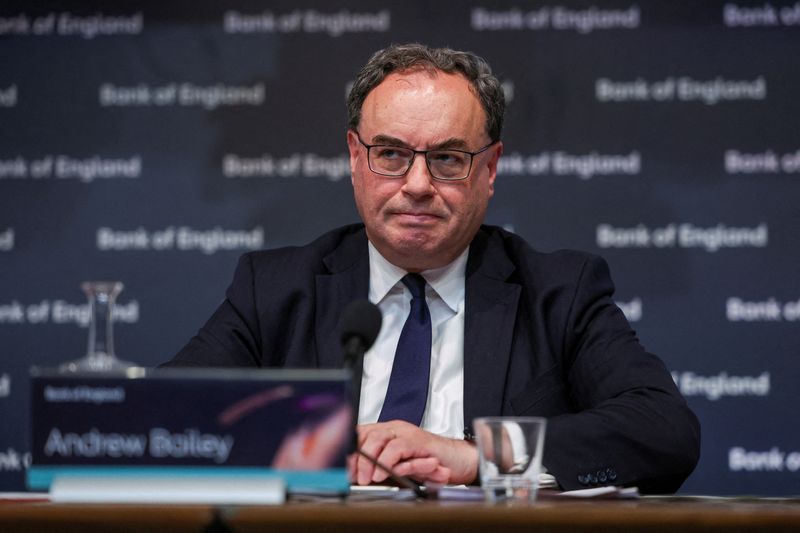By Francesco Canepa and Balazs Koranyi
SINTRA, Portugal (Reuters) -Bank of England (BoE) Governor Andrew Bailey said it remained to be seen if financial markets are right about how high the British central bank will need to raise interest rates, and how long it will be before the first rate cuts are made.
Financial markets currently price in the BoE raising rates from 5% now to 6.25% by the end of this year, which would be their highest since 1999.
"The market, I don't think, thinks we're nearly done at the moment. They've got a number of further increases priced in for us. My response to that would be: 'Well, we'll see,'" Bailey told an annual European Central Bank conference in Sintra, Portugal, on Wednesday.
Bailey drew a distinction between how high rates would go, and how long they would need to stay at their peak.
"I've always been interested that the market thinks the peak will be quite short-lived, in a world where we're dealing with more persistent inflation," Bailey said.
Some investors and economists think rate cuts could start in May next year if the economy falters.
The BoE rarely comments directly on financial markets' interest rate expectations, although they feed into its forecasts of growth and inflation.
The last time Bailey commented, in November 2022 when the BoE had just raised interest rates to 3% following weeks of turmoil after then prime minister Liz Truss's fiscal announcements, he said he did not expect rates to reach the 5.25% level which markets expected.
Since then, inflation has been slower to fall than the BoE hoped and stuck at 8.7% in May, the highest of any major advanced economy, prompting the BoE to raise rates by half a percentage point last week.
"The cumulative data - both particularly on the labour market and on the inflation release we had, which to us showed clear signs of persistence - caused us to conclude that we had to make really quite a strong move," he said.
The BoE had given little indication that it was considering a half-point move in the run-up to June's rate meeting, but Bailey said it was better to raise rates to 5% immediately than make a quarter-point rise and pre-commit to another for August.
Asked for an update to his outlook for inflation and the chance of recession, Bailey said the BoE was about to start work on a quarterly update to its forecasts.
The BoE has come under increasing criticism from politicians for its inability to control inflation and its emphasis on the need for wage restraint, and its own survey shows it has a record degree of unpopularity with the British public.

"At the moment I can understand why there are critics of us," Bailey said.
"We have a job to do. I am very clear that our job ... is to return inflation to target and we will do what is necessary. I understand the concerns that go with that but I am afraid I always have to say that it is a worse outcome if we don't get inflation back to target."